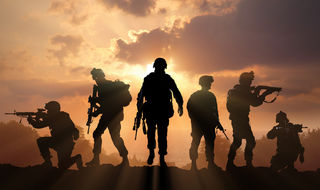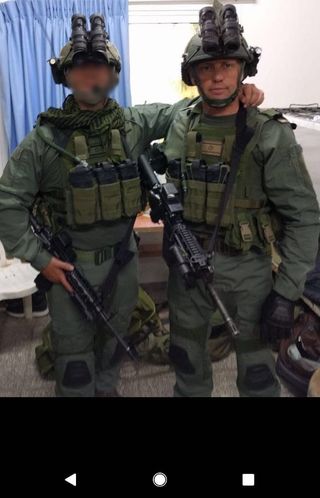Stress
The Ultimate Stress Test
Lessons from the Yamam Israeli counter-terror team.
Posted February 24, 2020 Reviewed by Ekua Hagan

This article was co-written with Dr. Itay Gil. He is an Israeli security and anti-terrorist expert who is also a combat member and instructor with the Yamam (Israel’s elite counter-terror warfare unit). Dr. Gil is one of the world’s leaders in counter-terrorism and resilience.
My previous article described how Israel is one of the world’s leaders in resilience therapy and how they are helping other countries deal with traumatic events. Israel has achieved this status as a world leader through its history of multiple hostile takeovers and occupations from foreign governments. Everyone in the country—men and women—must serve in the military. Everyone goes through basic training and has the very real understanding that they are risking their lives for their country. While all members of the military experience high stress levels and benefit from being resilient, the pinnacle of resilience and stress imposition resides with Yamam.

What Is Yamam?
The Yamam (Hebrew: ימ"מ) is the name for Israel's Elite Counter Terrorism Warfare Unit (similar to Seal Team 6 and Delta) skilled in hostage rescue and covert raids; efficient in military, SWAT, and undercover police tactics. They operate in all terrains, environments, and weather conditions including desert, water, mountains, etc. They are trained in bomb defusing, raiding ships, buses and planes, jumping out of planes, water rescues, and personal security for VIPs, etc.
Unlike other agencies, Yamam work in civilian, non-hostile areas. Each section includes all the elements needed for a successful operation: roping team, entry team, medic team, sniper team, K-9 team, EOD (demo and bomb disposal). In contrast to most army and special forces units who need to assemble specialists from different units, the Yamam are all permanently part of the same unit. They live, train, and operate together.
Because of this, Yamam has a fast deployment time and high coordination between various squads. It also means that teamwork and social skills are highly desirable traits. Yamam has successfully thwarted multiple terrorist attacks, hijackings, kidnappings, bomb threats, engaged militants, rescued hostages, and saved civilians from hundreds of terrorists and suicide bombers. Yamam has won the International SWAT competition (Urban Shield Award) multiple times, competing against 27 top-rated police and federal SWAT teams from around the world.
Dr. Gil notes that in the history of Yamam, there have been no suicides; no rogue agents who have broken down psychologically. How is this possible in the most stressful training environment imaginable? Is the Yamam only selecting highly resilient people or do they have the best resilience training? The answer is “yes, both.”
First, the selection process for Yamam is beyond tough, intense, and indeed weeds out applicants with low resilience (the focus of this article). Second, Yamam training is efficiently directed toward fostering resilience and high-stress management (this second factor, resilience training, will be the subject of my next article).
The Selection Process
The Yamam receives thousands of applications each year from young adults (22 to 30 years old). All applicants are seasoned combat veterans and most with elite special forces training. They are looking for some common skills such as: intelligence, physical fitness, motivation, trustworthiness, accountability, maturity, stability, judgment, decisiveness, teamwork, influence, and communication. Resilience is of high value and necessarily assessed during the entire screening selection process.

Step 1: Interviews
The first step in the selection process is interviews with team member professionals, including psychologists and psychiatrists. Recruits are asked many questions about family and lifestyle, in addition to questions about motivation and warnings about the challenges ahead. Following the interviews, the number of applicants drops by about 50 percent.
Step 2: Intelligence
Next, a variety of intelligence tests are administered, including logic and reasoning skills.
Step 3: Background Checks
There is an intense validation of each applicants’ background including family, social media, medical history, military history, and psych history.
These first three steps take six to eight months to complete. Those making it through this first process (about 150 people, less than 10 percent), are invited to “Hell Week.”

Step 4: Hell Week: It is actually six days and occurs at the end of the selection process. It is said to be one of the hardest in the world.
Days 1-2: Solo Mission. You are taken to an area where there are mountains and forests and given a map to navigate 10 kilometers on your own. Every 15 minutes, someone gets a map to go on a unique route. Every kilometer, there is a physical challenge like climbing under a bridge, holding onto a column and doing 10 pullups, crawling 100 meters through a muddy ditch, soaked with mud and a heavy pack, running to the next challenge to do 50 burpees, dragging a big tire 200 meters, climbing an 8-meter rope tied to a tree, etc. There is a hidden camera recording all the drills.
Day 3: The Beach. You wake up at 3 a.m. in shorts and running shoes, take a bus to a beach, and participate in strenuous physical drills for four hours—sprawling, pushups, sit-ups, in and out of very cold water. You are thirsty, freezing, and think you’re going back to the bus and the torturing is done. Now you’re told you are going for a swim. Hypothermia kicks in. A sergeant in a boat gives a nonsense speech for 15 minutes while everybody is treading water. You have to swim a couple of miles and if you touch a zodiac boat, you are immediately out. Those who quit can’t come back. At the end of this day, there are about 70 to 75 left (60 percent drop out).
Days 4-5: Technical Skills/Stress Tests. You are challenged with memorizing tasks (like subtle clues from photos) and mental drills under very high-stress environments (being yelled at, etc.) in between extreme physical challenges to exhaustion like combat fighting, taking apart and reassembling multiple types of weapons while being timed and not allowed to finish, fighting multiple opponents, being kidnapped, wrestling matches, defusing bombs (fake), finding a knife on the ground and having to fight to get to it, etc. At the end of this day, there are about 50 left.
Day 6: Last Day, Interviews. Everyone (about 50 people) in the room together. You are interviewed about how you feel, how you think you’ve done, if you've been honest, etc. Then they show the videos from the solo missions and see who was honest and trustworthy. They call out each person’s number who cheated on a task and they are immediately let go. At the end of this day, about 10 more people are kicked out. Now, they are down to about 30 to 35 people.
Whoever makes it to this point is invited to start the nine months of intensive training which decreases the numbers to between 9 and 14 people. That’s approximately 0.5 percent of the initial applicant pool of already highly trained military professionals!
Finding Resilience
What is it about the Yamam officers selected that might make them more resilient and better able to cope with severe stress? These six factors are highly-valued character traits for which candidates are specifically screened.

- Motivation and psychologic stability
- Excellent physical conditioning
- Emotional intelligence
- High intellectual capacity
- Great social skills and teamwork
- Excellent problem solving and physical skills
Being more mature (most are in their mid-30s), having a very lengthy and rigorous screening process, and imposing several forms of stress including mental, emotional, and physical has resulted in a remarkable group of highly dedicated and amazingly resilient officers. The final Yamam members selected such as Dr. Itay Gil have high coping strategies as their baseline. Once they have been selected into this elite unit, their real resilience training begins. This is the subject of my next article with Dr. Itay Gil.
Resilience has become a popular catchphrase. Employers, high-risk jobs, military and law enforcement, and stressful professions are all in search of resilient personnel. Perhaps we can learn some lessons about the true nature of resilience and how to find it from the Israeli Yamam.




